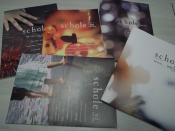Watching television is a daily routine for many Americans. We try to escape boredom with the entertaining shows and visually appealing commercials. What we take in from these video texts, however, is a completely different story. In our politically-ethical age, when every cultural group has adopted an ideology it feels immune from criticism, it's refreshing to find someone who views the world with an open mind. Robert Scholes, author of the essay, "On Reading a Video Text,"ÃÂ is critical on America. Scholes focuses on several key concepts in describing how we process a narrative text like that of the story in the Budweiser commercial.
He suggests that visual representation through the medium of video is a method of communication that has been developed to give the viewer power and insight, and most of all, relief from boredom. "Visual fascination"ÃÂ is cinematography techniques such as camera angle, lens color, and background music that provide pleasure for the viewer.
Scholes explains that video texts can either hold "power over the viewer,"ÃÂ or act as "extensions of the viewer's own optical power, or both"ÃÂ (619). With this beer advertisement, Scholes is able to exemplify one type of video text as "cultural reinforcement"ÃÂ (620). Cultural reinforcement is assuring someone that they are part of a culture. This particular advertisement holds true to all Americans because through the African-American man's pursuit of a career as a baseball umpire, it seems that racial equality is possible through hard work.
In the beer commercial, Scholes maintains that with the information provided to the viewer in a format of twenty-eight seconds, conclusions about the main character's entire life can be drawn "provided we have the cultural knowledge upon which this construction depends"à(620). Cultural knowledge is understanding the rules and rituals of culture and knowing your cultural background. It is assumed that an audience that understands the particular video text analyzed by Scholes, is an audience that has a significant amount of cultural knowledge in the area of baseball. The viewer who is also familiar with American ethics and society sees the story progress from small-town dreams, hard work, perseverance, to a "big break,"àthe first real test,"àand the passing of the test. The actual product being advertised holds little relevance to the commercial. It is after the success of the umpire that the manager toasts him with a bottle of Budweiser beer. Scholes explains that in constructing this "life story"àfrom this short video text, viewers "draw upon a storehouse of cultural information that extends from fairy tales"æ"à(621).
This type of advertisement appeals to viewers because it arouses the desire to have faith in the system and belief in the American dream. It utilizes our society's "fairy tales"àto manipulate viewers' emotions. The video text is designed to sell a product, but it surely sells the "ÃÂAmerican way first and then seeks to sell its brand of beer"æ (622). In combination with "visual fascination"àand the "matrices of power and pleasure,"àan audience is able to surrender to the effectiveness of the ad. For example, the utilization of the close-up and slow motion of how close the call is can be used to the viewers' realization of an actual real instant replay that would occur in a real baseball game aired on television. The runner is called out and in effect the "manager's charge from the dugout"àand the "ump's self-control and slow walk away from the manager"àare gestures all too familiar with the All-American sport, baseball. Taking into account all of these aspects, it is very apparent that "American's are not without culture"æ What they really lack for the most part, is any way of analyzing and criticizing the power of a text"æ"à(623).
Scholes stresses the difference between mythologizing great ideas and works "in which our cultural heritage is embodied"ÃÂ and taking a dialectical approach to the interpretation of ideas. Through the example of the beer commercial, Scholes exemplifies that it is "necessary to have the tools of ideological criticism"ÃÂ (623). Ideological criticism is the questioning and investigating of our core beliefs and the core beliefs of others. He believes it is beneficial to viewers of video texts to be able to critically examine the information being given them. Scholes emphasizes that "in this age of massive manipulation and disinformation, criticism is the only way we have of taking something seriously"ÃÂ (623).





